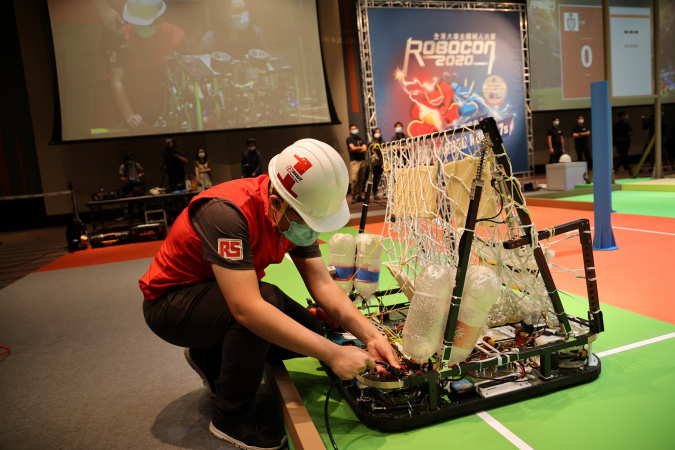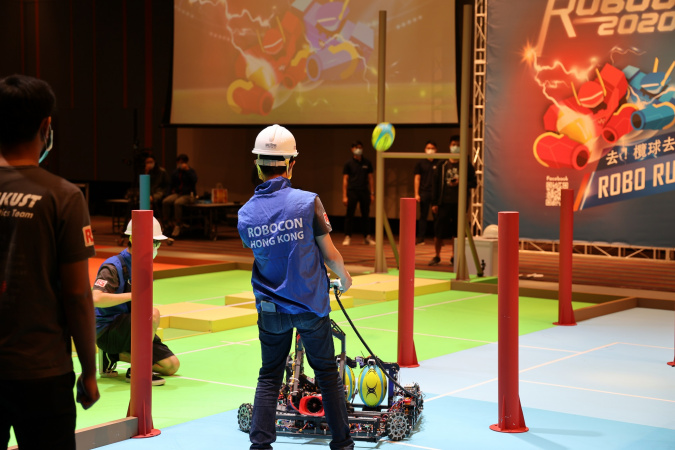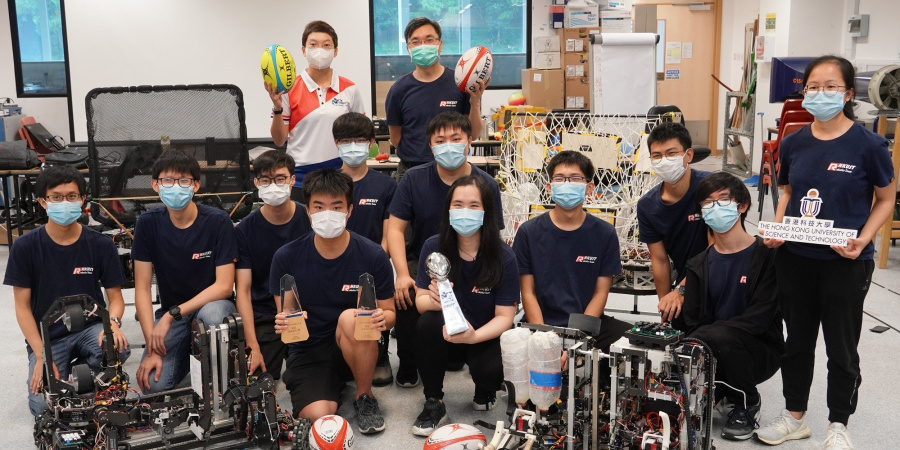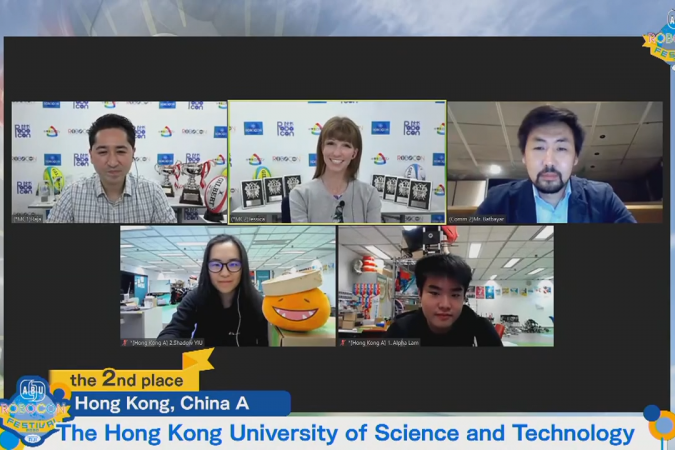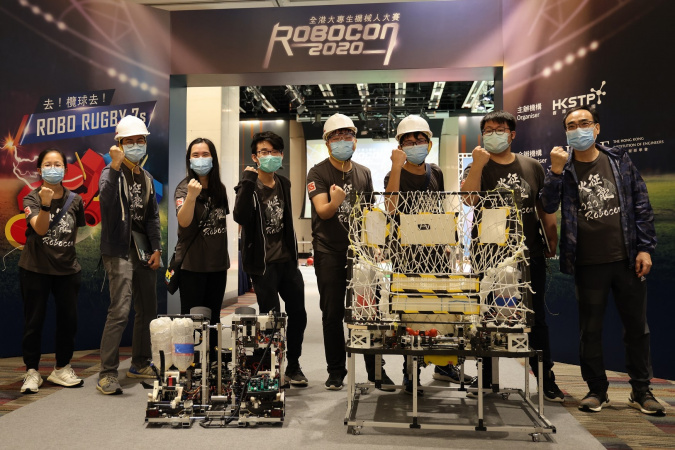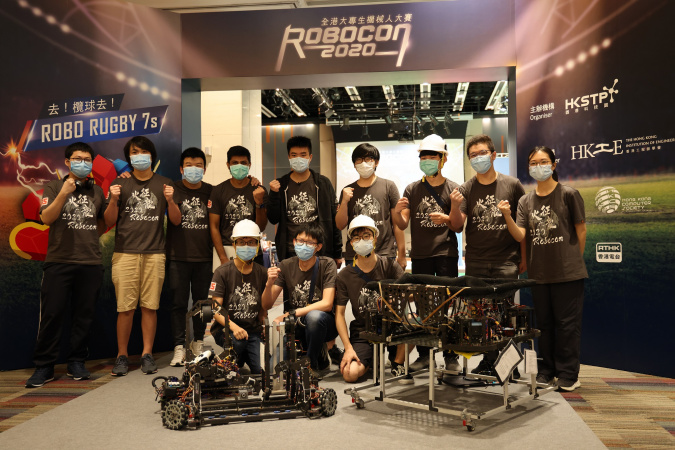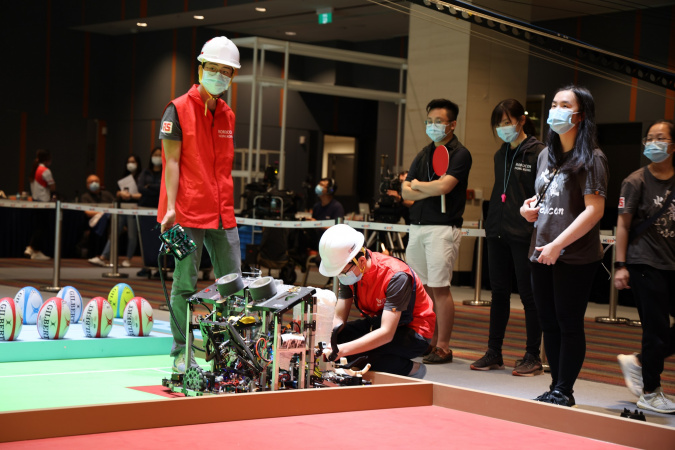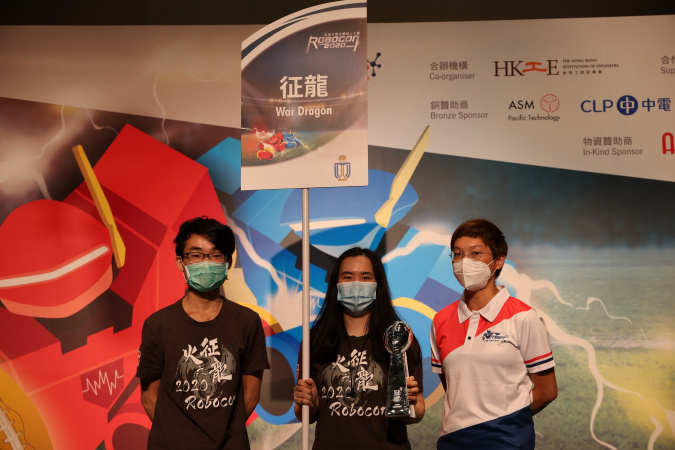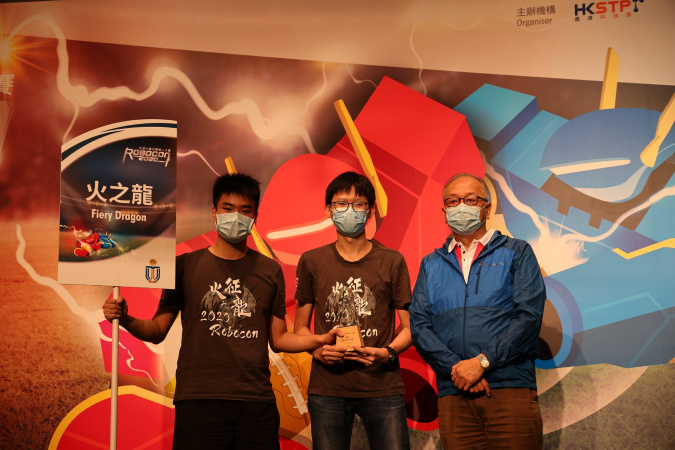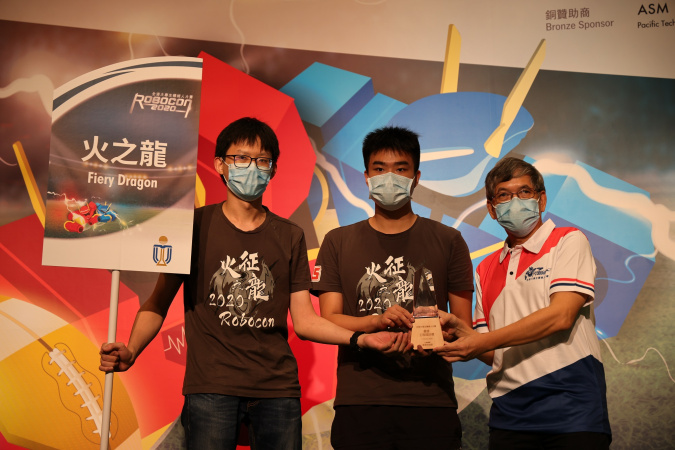HKUST Won First Runner-Up in ABU Robocon Festival and 10th Championship in Robocon HK Contest
The HKUST Robocon Team won three awards, namely the First Runner-Up, Best Presentation Award, and a Special Award in ABU Robocon Festival 2020, which was joined by 21 winning teams from 11 places in Asia-Pacific on December 12. Organized annually by the Asia-Pacific Broadcasting Union (ABU), the ABU Asia-Pacific Robot Contest (ABU Robocon) was held online for the first time this year as “Robocon Festival” due to the COVID-19 pandemic.
The HKUST team was commended by the judges for their highest-speed robots in the competition and superb and futuristic presentation. The Special Award was selected by the sponsor Nagase Brothers Inc. for their robots’ excellent agility. Their robots can accelerate and decelerate quickly, but at the same time can catch the rugby balls softly and gently.
Previously on September 6, the team formed into two sub-teams and scooped three awards in the Robocon 2020 Hong Kong Contest, which was organized annually by Hong Kong Science and Technology Parks Corporation (HKSTP) to nurture future engineers with a passion for robotics. The War Dragon sub-team was crowned champion, which marked HKUST’s 10th championship in the contest since 2004, while the Fiery Dragon sub-team received the Best Engineering Award and Best Artistic Design Award.
Themed “ROBO Rugby 7s”, this year’s contest required teams to build two robots to collaborate in picking up, passing, receiving, and kicking the rugby ball to score successful goals. The two sub-teams consisted of a total of 29 multidisciplinary undergraduates, including nine non-local students who come from India, Indonesia, Japan, Korea, Malaysia, Taiwan, and Vietnam. With almost all competitions this year cancelled, postponed or moved online due to the coronavirus outbreak, the Robocon contest has become the first physical robotics competition in Hong Kong since the pandemic hit the city.
Adapting swiftly to unprecedented challenges
Because of the evolving epidemic situation, students faced unprecedented challenges in preparing for the contest since the beginning of this year and they needed to keep adjusting their strategies, manpower and psychological state. The Fiery Dragon team, which was made up of half local students and half non-local students, was affected by the manpower shortage when the non-local members who went back to their home during the winter break could not come back to Hong Kong after the Chinese New Year. With only half team in Hong Kong, the task of designing and building the robots, which was a fundamental first step in the whole work cycle and normally taken up by at least six students, was now undertaken by three students only.
While the problem less affected the War Dragon team, which was comprised of all local students, anti-epidemic measures such as social contact reduction and gathering restrictions posed difficulties to the students’ usual practice of working together in the lab. “Preparation for a robotics contest requires a lot of teamwork as well as physical interaction, such as assembling, testing and fine-tuning the robots. To adjust to a new way of working, we met in regular Zoom meetings, moved tasks to finish at home as much as possible, and staggered working time in lab so fewer people stay at one time,” said Fiery Dragon’s team leader LAM Cheuk-Hei, a Year-3 mechanical engineering student.
Determined to continue despite uncertainty
In March when the pandemic crisis escalated globally, the participating institutions voted and came up with a consensus that the contest would be postponed from end June until next year for safety reason. While some students changed their plans to look for summer internships to utilize the suddenly available time, most of them decided to continue with the unfinished work. “The students were discussing among themselves if they should continue the work, and if they do, what are they doing this for?” said Prof. Tim WOO, Director of the Center for Global & Community Engagement and supervisor of the HKUST Robocon Team. “After deliberation, their answer was simple and clear – they joined the team because they wanted to learn and hone their skills. So they wanted to continue to achieve these goals even though the contest may not take place.”
In May when the local epidemic situation stabilized, HKSTP announced that the contest would be resumed in August. Since then, the non-local members gradually returned to Hong Kong. They rejoined the team after 14 days of quarantine. However, since some members already committed to internships, they cannot devote as much time as before to the contest. Yet, they still came back to help in the lab after they are off from work. To catch up the schedule under the constraint of gathering limit, the students had to stagger working hours in the lab to 24 hours a day and the lights in the lab stayed bright day and night.
As the teams worked feverishly towards the competition, the third wave of epidemics in July forced the competition to be postponed once again until early September. To minimize social contact, the game was to be held behind closed doors and the format was changed from elimination matches between two teams to an individual competition by each team. This change meant that each team only had one chance to perform to their best, unlike in the past when each team competed in a few rounds and they have more chances to recover lost marks if mistakes were made in one of the rounds.
Good preparation to facilitate last-minute change in strategy
With the shorter game time, the on-site trial run held on the day before the competition became more critical than ever. Yet, the time for each team this year was shortened to one and a half hours. “To fully utilize every second, we planned carefully and made a do-to list that included the items to be tested and allocation of time and manpower,” said War Dragon’s team leader YIU Cheuk-Tung, a Year-3 computer engineering student.
Both the War Dragon and Fiery Dragon sub-teams were using the independent steering driving system for their robots. The system has been developed by the HKUST Robocon Team since 2018 and first put into use in the competition this year. It can increase the speed of the robots substantially and is adopted by many strong teams in the Asia-Pacific Robocon.
Both sub-teams planned to make the best use of the system by running the robots in automatic mode, which is much faster than the manual mode. Yet during the trial run, the sensors on Fiery Dragon’s robots were damaged and War Dragon’s performance was also not as stable as in the lab – both due to the minor discrepancy between the lab environment and the actual game field. Given that there was not enough time to make big modifications to the robots, the two teams decided to sacrifice the speed for a more stable performance by changing to manual mode and semi-automatic mode respectively. Luckily, both teams had prepared for the worst and trained to operate in both auto and manual modes over the past few months. They were therefore able to change their strategy quickly and delivered their best performances.
The War Dragon sub-team finally became the only team in the competition to achieve full marks and took the championship. Following the victory, the students went on to participate in the ABU Robocon Festival 2020 and gained three awards, including the First Runner-Up.
Related links:
- A video of how the HKUST Robocon Team prepared for the contest
- Official website of ABU Robocon Festival 2020
